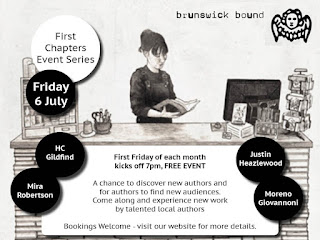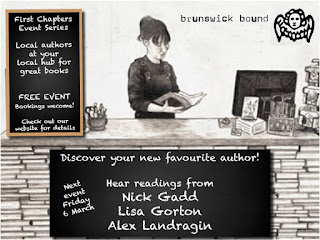First Chapters Q&A with HC Gildfind
HC Gildfind lives in Melbourne and has published short stories, poetry, essays and book reviews in Australia and overseas. Gildfind has also researched interwar Australian literature and history and has been mentored by novelist Andrea Goldsmith. She will be reading from her book of short stories The Worry Front.
We asked HC some general bookish questions because we were interested in finding out more about her and this is what she had to say.
1. Brunswick Bound has asked you to read a story from your short story collection. Tell us what we can expect from the story you have chosen?
We asked HC some general bookish questions because we were interested in finding out more about her and this is what she had to say.
1. Brunswick Bound has asked you to read a story from your short story collection. Tell us what we can expect from the story you have chosen?
I’ll read one of two stories. The voices of the characters in ‘Eat. Shit. Die.’ are energetic, funny and engaging (or so I think!), and my affection for them is hopefully contagious in a public reading. ‘The Wished For’ is a much more subtle and dark story, but the tension which drives it will hopefully grip an audience.
2. How would you describe the kinds of books that you write?
I guess my work falls into the category of literary fiction. That sounds so dry and off-putting!
Anyhow, I try to write in different voices because this is good ‘exercise’ for my writing muscles, and because I think reading and writing are about imagining yourself into others’ minds and lives.
We’re constantly told that Carver and Hemingway represent the zenith of short story writing, and though I respect their work, I’m sick to death of stripping stories down to their bones. I’m sick of emaciated stories! So, I’m increasingly interested in ‘mucking around’ with my work, in trying to focus on the energy in the work, and in trying to stop feeling inhibited by what I ‘should’ be doing.
Anyhow, I try to write in different voices because this is good ‘exercise’ for my writing muscles, and because I think reading and writing are about imagining yourself into others’ minds and lives.
We’re constantly told that Carver and Hemingway represent the zenith of short story writing, and though I respect their work, I’m sick to death of stripping stories down to their bones. I’m sick of emaciated stories! So, I’m increasingly interested in ‘mucking around’ with my work, in trying to focus on the energy in the work, and in trying to stop feeling inhibited by what I ‘should’ be doing.
3. What was the first book that you read (or had read to you) that left an impression on you?
The first books that showed me how reading can magically transport you into other worlds were Enid Blyton’s The Magic Faraway Tree series, and old classics like: Edith Nesbit’s The Railway Children; L. M. Montgomery’s Anne of Green Gables series; Frances Hodgson Burnett’s A Little Princess and The Secret Garden; Anna Sewell’s Black Beauty; and Kenneth Grahame’s The Wind in the Willows. I adored these books, and I’d reread them endlessly. Looking back from today, though, they strike me as almost creepily ‘wholesome’—and soooo British! Oh dear!
4. Do you believe that books should answer life’s big questions?
Big questions have no answers, everyone knows that! It’s asking the questions that matters, and the more you ask, the more you explore—and the more refined your questions become. You can only hope to gain insight. For me it’s ‘not knowing’ that drives reading and writing, because it’s ‘not knowing’ that makes life both hard and fascinating.
5. What’s your go-to solution for writer’s block?
So, recognise that feeling ‘stuck’ is, firstly, just a feeling and, secondly, simply a part of the writing process. Feeling stuck is good. It means you’re creating something new and sophisticated, with its own unique problems: attempting to fix these problems is your job, and the only way to learn your craft!
When you’re feeling stuck, I can only recommend that you keep tackling the work as regularly as possible. Keep struggling with it, but do lots of other things too. Run, walk the dog, cook, clean, do your wage-slave work, spend time with your beloveds—but keep returning to the writing.
Finally, if you’re always blabbing on about ‘writer’s block,’ or how you’d write ‘if only you had the time/money/idyllic situation’—don’t kid yourself. Writers write, because they prioritise writing. Wannabe writers find endless excuses not to.
6. Which words or phrases do you overuse?
Getting edited was humiliating! I was forced to see how many words, phrases and sentence-structures I repeat! I start too many sentences like this: Again,… Then,… Suddenly,… And I often write the same sentence twice, as if the first sentence is a draft of the second. Stupid!
Worse still, it was pointed out to me that different characters in different stories had the same names. I realised this is because I loathe naming characters, which means I’ll use whatever names are floating around me as I work: beware the character that materialises whilst my dog wanders past!
Worse still, it was pointed out to me that different characters in different stories had the same names. I realised this is because I loathe naming characters, which means I’ll use whatever names are floating around me as I work: beware the character that materialises whilst my dog wanders past!
7. What do you put down as your occupation when asked?
I asked a friend if she ever copped contempt when she called herself an artist, as I often have when I’ve ‘dared’ to call myself a writer. She said ‘No!’ but then she thought about it and she said, ‘Hmmm, actually, I think I just lie a lot!’ In other words, depending on who’s asking, she tells people whatever shuts them up and gets them off her back. This seems good advice in general!
I run a very small business, and I generally say that’s my ‘job.’ If it’s relevant, and I’m with a genuine person, I might mention I write too. When I’m filling in forms etc., it depends what the form is for!
I run a very small business, and I generally say that’s my ‘job.’ If it’s relevant, and I’m with a genuine person, I might mention I write too. When I’m filling in forms etc., it depends what the form is for!
8. What is the question that you hope never to be asked in an author Q&A?
I don’t like talking about my work’s ‘meaning’: it’s the reader’s job to co-create a story; the story means what it means to them. And no-one should be asking writers about their personal lives. The power of the written word is its capacity to exist autonomously in the world—what’s the writer got to do with it?!
9. What question do you hope you will be asked and why?
Writing both creates, and is fed by, wider ‘cultural conversations’. I’m very interested in talking about the general issues that concern people, and I really hope my writing contributes, somehow, to such conversations. I have a lot of time for people who are looking outwards, instead of (only) inwards—and no time at all for people who just want to blather on about themselves.
10. Which book that you have read do you think should be better known or more widely read?
Easy question! Eve Langley’s 1942 novel, The Pea Pickers. Both this book, and its author, are totally unexpected, incredibly complex, brilliant and stunningly beautiful. For more info go here:
http://neglectedbooks.com/?p=4288A.
For more information about First Chapters visit our website.
http://neglectedbooks.com/?p=4288A.
For more information about First Chapters visit our website.





Comments
Post a Comment